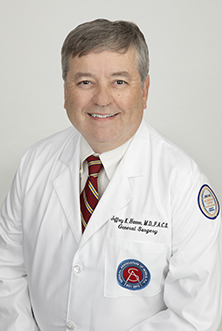Today, we sit down with Dr. Jeffrey Hannon to discuss some frequently asked questions about Gastroesophageal Reflux Disease or GERD, also known as chronic acid reflux and heartburn.
 Q: Why Does GERD Occur?
Q: Why Does GERD Occur?
Dr. Hannon: Typically, chronic acid reflux or GERD is caused by a weakened Lower Esophageal Sphincter or LES, the valve that separates the esophagus from the stomach and prevents stomach acid from flowing back.
There are several reasons why these muscles could be weak and anything that puts strain on the abdomen, such as obesity or pregnancy, can exacerbate acid reflux.
Some patients may have a hiatal or paraesophageal hernia that contributes to acid reflux.
Lastly, acid reflux may be caused by certain procedures. A Heller Myotomy for the treatment of achalasia, the gastric band and the gastric sleeve may all cause or worsen GERD in some patients.
Q: How Many People Suffer From GERD?
Dr. Hannon: The exact number of GERD suffers is impossible to pinpoint as many go undiagnosed, however it is estimated that up to 20-30% of the population suffers from some form of chronic acid reflux.
Q: How Do I Know I Have GERD?
Dr. Hannon: Virtually everyone has a bout with acid reflux occasionally. However, when acid reflux persists – several times a week for three weeks or more, we begin to suspect chronic acid reflux or GERD. GERD is characterized by pain or burning in the chest or throat, dry cough, regurgitation and/or bad breath. It can even cause asthma. However, any of these conditions may be indicative of a different problem, so the best course of action is to visit your primary care physician or a GERD specialist, such as a gastroenterologist.
Q: Does GERD Affect the Heart?
Dr. Hannon: While acid reflux is sometimes called heartburn, it has nothing to do with the heart. One of the telltale signs of heartburn is a painful burning sensation in the center of the chest. Some people confuse this for a heart attack or heart problem. As a result, GERD is a common reason for ER visits. Of course, we always patients to take any sort of chest pain seriously and have a complete evaluation to check for heart disease in these cases.
Q: Do I Have to Treat GERD?
Dr. Hannon: Beyond the discomfort caused by chronic acid reflux, there are several medical concerns regarding uncontrolled reflux. First, the sensitive lining of the esophagus can become inflamed and cause it to narrow. This can make it difficult for patients to swallow. The constant barrage of acid on the esophagus can also cause changes at the cellular level. This is known as Barrett’s Esophagus.
Q: Can chronic acid reflux cause cancer?
Dr. Hannon: As I mentioned above, stomach acid can cause a cellular change in the lining of the esophagus called Barrett’s Esophagus, which in very rare cases can lead to esophageal cancer. Patients with Barrett’s Esophagus should be screened regularly.
Q: What are the treatment options for GERD?
Dr. Hannon: We take a stepped to approach to treating GERD. For some, eating 5 smaller meals vs 3 larger ones, losing weight and eliminating spicy, fatty and processed foods is enough to keep the stomach acid controlled. Failing lifestyle change, many patients will start with a medication regimen. These medications either suppress the production of acid in stomach (Proton-Pump Inhibitors) or neutralize it (Antacids). In cases where the medication causes significant side effects or is not effective, a total (Nissen) or partial (Toupet) fundoplication surgery may be employed for longer-term relief.
A relatively new medical device known as LINX can also be employed to control GERD. The LINX device is essentially a bracelet of titanium beads (closed magnetically) that wraps around the LES and reinforces the muscles of the esophagus. Acid is kept in the stomach, but the device stretches just enough to easily let food and liquid through.
If surgery is indicated, we will check for and correct hiatal or paraesophageal hernias that may be causing some of the symptoms of GERD.
Q: Does Bariatric Surgery Cure GERD?
Dr. Hannon: Many patients suffering from GERD will see significant relief after bariatric surgery. This is especially true for gastric bypass patients. However, a small percentage of gastric sleeve and gastric banding patients may see their GERD worsen. Therefore, if the patient is suffering from poorly controlled or uncontrolled GERD, gastric bypass is usually the procedure of choice.
During the primary bariatric procedure, we check for a hiatal hernia, which if found, will be corrected simultaneously.
Q: Can GERD be Prevented?
Dr. Hannon: for most patients, GERD represents a lifestyle issue that can often be corrected by improving diet and exercise habits and losing weight. Even small changes in what we eat and how much we weigh can make a big difference. Medical and surgical treatment is only considered when acid reflux cannot be controlled by lifestyle changes alone. Consultation with a physician experienced in GERD treatment can help decide whether these changes can produce improvements in quality of life.




